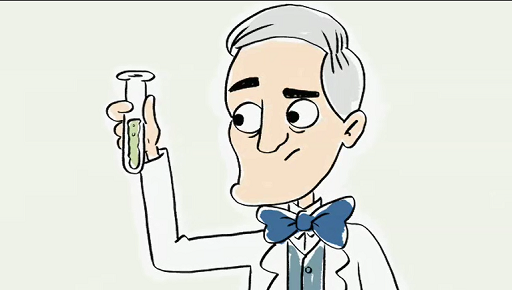2 Innovations discovered by Scottish medics
You will now continue on the theme of historic innovation in this section where the focus turns to discoveries which transformed the way we experience health care today, particularly the discoveries of two Scottish medics, Sir James Young Simpson and Ian Donald.

In 1847, Sir James Young Simpson pioneered surgical anaesthesia. As an obstetrician he was concerned by the pain of childbirth and sought ways to alleviate it, so he travelled to London and met with Robert Lister, a surgeon, who pointed out the use of ether as an anaesthetic in an operation. In 1799 Sir Humphry Davy had used nitrous oxide, otherwise known as laughing gas, for this purpose.
Simpson was appointed as physician to Queen Victoria while she visited Scotland in 1847, and it was on that trip that Simpson and Lister decided to experiment with chloroform. After inhaling chloroform one evening they found that they felt cheerful and in good humour. However, they collapsed and didn’t gain consciousness until the following morning. Simpson knew as soon as he woke up that he had found something that could be used as an anaesthetic.
More recently, in 1955, a Scottish physician, Ian Donald, observed ultrasound being used in the shipyards of Glasgow and pioneered its use in diagnostic medicine (Digital Health and Care Institute, 2018). Other important developments were to follow, such as the use of superglue, which was originally used to stop soldiers from bleeding to death during the Vietnam War.
Many other innovations have been discovered by accident: possibly the most famous is by Alexander Fleming, who discovered penicillin, and later won a Nobel Prize for his research into it. This is the focus of the first activity.
Activity 1 Accidental discovery
Watch the following video about the discovery of Penicillin, then answer the questions in the box below.

Transcript: Video 1 Alexander Fleming and the accidental mould juice
[CREAKING]
[CHURCH BELL]
[BRASS FANFARE]
[NEIGHS]
- Why is Alexander Fleming’s discovery described as accidental?
- Why was it timely that Alexander Fleming discovered penicilin?
- How effective was it?
- What are the limitations of the medicine?
Discussion
- Fleming was described as someone who was untidy in nature so when he returned to his lab after some time away, he discovered a petri dish with culture in it that had been left behind. He noted that some of the bacteria had been killed off.
- Fleming’s discovery was extremely timely since he saw first-hand how soldiers in the battlefields of the First World War were being treated for their wounds with the use of antiseptic. Many soldiers died as a result.
- With the invention of penicillin, millions of lives were saved. Penicillin was also critical to treating the wounds of Second World War soldiers.
- While penicillin has gone on to save millions of lives, its overuse has led to certain bacteria becoming resistant to it, which has led to superbugs such as MRSA which are immune to penicilin.
If you want to learn more about resistance to antibiotics, visit the free OpenLearn course Understanding antibiotic resistance [Tip: hold Ctrl and click a link to open it in a new tab. (Hide tip)] .
Clearly, the nineteenth and twentieth centuries were a time of great invention and innovation, to which Scotland contributed significantly. There have been many innovations that have led to significant improvements in the lives of the population.
The focus of the next section is on exploring other advancements in healthcare.
